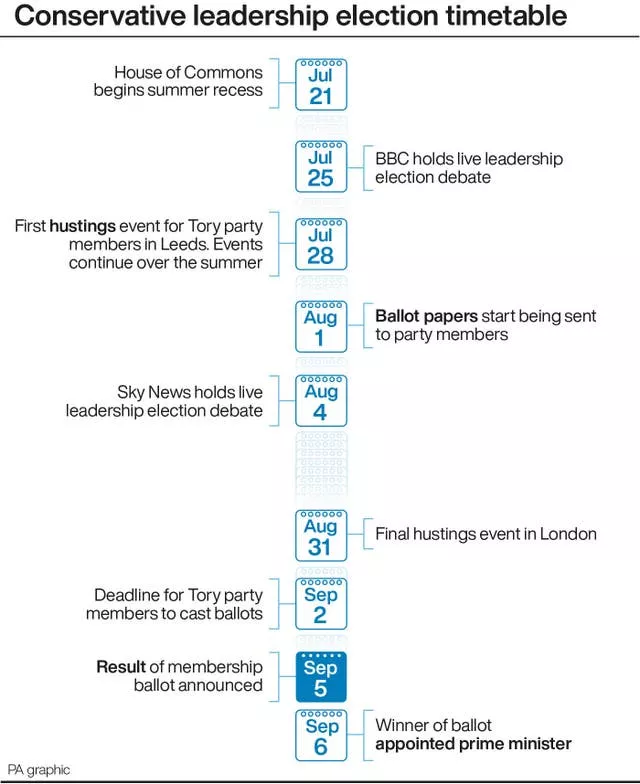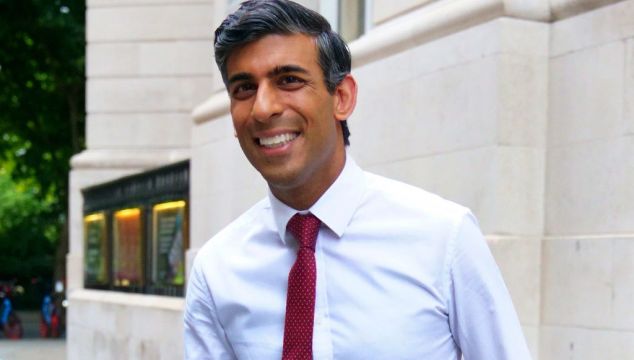Rishi Sunak has claimed the current evidence suggests the Conservatives would suffer a defeat at the next UK general election under Liz Truss’s leadership.
The former chancellor, one of the two remaining candidates vying for the top job in No 10, also warned that going on a “huge borrowing spree” would only “make the situation worse” when it comes to inflation.
Meanwhile, he revealed that “one of the first” things he plans to do if he is made prime minister is to appoint an independent ethics adviser.
He told Tonight With Andrew Marr on LBC: “If you look at all the polling evidence that we have, and you see what that says, it’s pretty clear that I am the person that is best placed to defeat Keir Starmer in the next election.”
Asked if that means that if the Conservative Party chooses Ms Truss as its next leader it is likely to go down to defeat in the next election, he replied: “That’s what all the evidence that we have today would show, and that’s what our members will need to consider.”
Earlier, Ms Truss defended her tax cut plans costing at least £30 billion a year as “affordable” as the economic policies of the Tory candidates for prime minister came under scrutiny.
Mr Sunak was understood to not be envisaging cutting personal taxes until at least autumn next year to avoid fuelling inflation.
But Ms Truss, the UK foreign secretary, promised an emergency budget to reverse the national insurance hike immediately under her proposals to drive growth.
Speaking to LBC, Mr Sunak warned that going on a “huge borrowing spree” would only “make the situation worse” when it comes to inflation.
He defended his planned rise in corporation tax, saying the increase was “perfectly reasonable”.
“What we are doing is actually combining that with some other reforms to make the system much more generous for the things that we know actually drive growth, and that’s businesses to actually invest,” he said.
“It’s all very well businesses making a profit, and that’s something fantastic that I support. But what I want them to do with that is to invest that in the economy. That’s how we help drive growth in this country.
“So even though the corporation tax will go up, I think that’s really perfectly reasonable because everyone knows we’ve spent a fortune during Covid to help get the country through it, businesses got a lot of support.”
The financial plans of the final candidates for prime minister were growing ever more divided as they battled for the votes of the Tory membership required to win the race for No 10.
Robert Joyce, the deputy director of the Institute for Fiscal Studies (IFS) think tank, put Ms Truss’s tax cuts at “more than £30 billion per year – and possibly considerably more”.
The plans “mean higher borrowing or less public spending, or some combination”, he said, though their impact remains unclear because Ms Truss’s plans are “yet to be fleshed out”.
“Without spending reductions, the tax promises would likely lead to the current fiscal rules being broken, and Ms Truss has hinted that the fiscal rules may change,” Mr Joyce added.
But Ms Truss defended her plans to scrap the scheduled corporation tax rise and suspend green levies on energy bills as “not a gamble”.
In his pitch to Conservative members after MPs selected the final two candidates, Mr Sunak argued that only he is capable of beating Labour in a general election.
But Ms Truss hit back by saying the Tories would struggle to win under the current economic policy written by Mr Sunak when he was in No 11.
Mr Sunak has vowed not to cut taxes until the soaring rates of inflation are under control, fearing that such a move could make the crisis worse.
But he told LBC “of course” he wants to put more money in people’s pockets.
“I think I’ve demonstrated over the past couple of years that as and when the situation demands it I will act to help people get through it,” he said.
Mr Sunak said he wants to “restore trust in Government” as prime minister.
He said: “That starts with being honest with people, honest about the challenges that we face, but also the change that I will bring to grip them, but it also means not promising things that can’t be delivered.”
Mr Sunak told LBC his life would be easier if he vowed to do “this lovely sounding thing and this lovely sounding thing”, but argued that would not be leadership.

“I think it would damage trust, because part of rebuilding trust is for the Government and politicians to deliver the things that they say, and sitting here promising you a bunch of things that I don’t think are right or deliverable would be wrong,” he said.
Mr Sunak was the parliamentary party’s favourite, winning 137 votes to Ms Truss’s 113 among Tory MPs.
But bookmakers placed the foreign secretary as the frontrunner, with early indications suggesting she is more popular with Tory members ahead of a summer of campaigning.
A small, unrepresentative poll of 730 members on Wednesday and Thursday again saw Ms Truss in the lead.
Some 49 per cent of respondents said they would back the foreign secretary, while 31 per cent chose Mr Sunak.
The rest were undecided or said they would not vote.

The pair battled to win the support of local politicians on Thursday when they took part in a private hustings for the Conservative Councillors’ Association.
They will tour the UK to take part in 12 hustings for the Tory members who will vote for their next leader, with the result being announced on September 5th.







